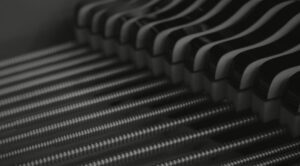Piano tuners at Coach House Pianos
We believe the key to maintaining your piano to the highest standard is by ensuring that it is regularly tuned by a competent tuner. We recommend that your piano should be tuned at least twice a year. Piano teachers and professional pianists should have their pianos tuned quarterly. Coach House Pianos have years of experience when it comes to pianos, and it would be our pleasure to share some advice about piano tuning.
Does my piano require a tuning?
There are various situations in which your piano might need tuning. All pianos are designed to be held at the note A, which is 440 Hz at concert pitch. When a piano is at this pitch, the international pitch standard, the pianist can stay in tune with other musicians who are using different instruments.
However, over time, a piano can go out of tune. This is because the piano’s strings are always exerting a force on the tuning pins that are held by a wooden plank (wrest plank). Factors as simple as changes in temperature and humidity will lead to the piano gradually going out of tune. High humidity, for example, can sharpen the pitch, while low humidity can flatten the pitch.
Therefore, even if your piano is rarely or never played, you should have it tuned at least once a year. Arranging this as a matter of routine can help prevent an unpleasant repair bill further down the line. However, there are particular scenarios in which having that piano tuned more often than once yearly is advisable. These include if the piano has just been moved, such as for a home move or business relocation. Vibrations during the move itself will cause some disruption to the tuning stability, however, not as much as the acclimatisation process of the piano settling into a new environment. Tuning the piano just once yearly will also be insufficient if it is played hard or regularly.
Can all pianos be tuned?
The type of tuning we will provide and the charge for it can depend on the piano to be tuned. Miniature pianos, except some Eavestaff models, can be relatively hard to tune due to their shorter, stiffer strings. There can also be difficulty with tuning older pianos, which can have corroded strings and hammers that, at their striking surface, have been worn flat. It may also be impossible for some older pianos to stay in tune due to the tuning pins no longer being gripped by the wrest plank – fluctuations in climatic conditions can cause the wooden wrest plank to expand and contract resulting in splits around the tuning pins, causing them to become loose and unable to retain the tension of the strings.
Over-damped pianos, which were produced until the 1930s, feature damper wires that impede the use of the muting wedge, a crucial tool for piano tuning. Tuning miniature, older, and over-damped pianos can, therefore, incur higher charges than basic tunings, as would our professional concert tunings.
You might also have to pay more if the piano is severely out of tune, as this could call for a pitch raise. This is a method where the piano is roughly tuned to make the pitch almost precisely correct before a fine tune is possible to carry out.
FIND A PIANO TUNER
We recommend you only use a fully trained and qualified Piano Tuner with the PTA accreditation, to find a tuner in your area visit the following link:

